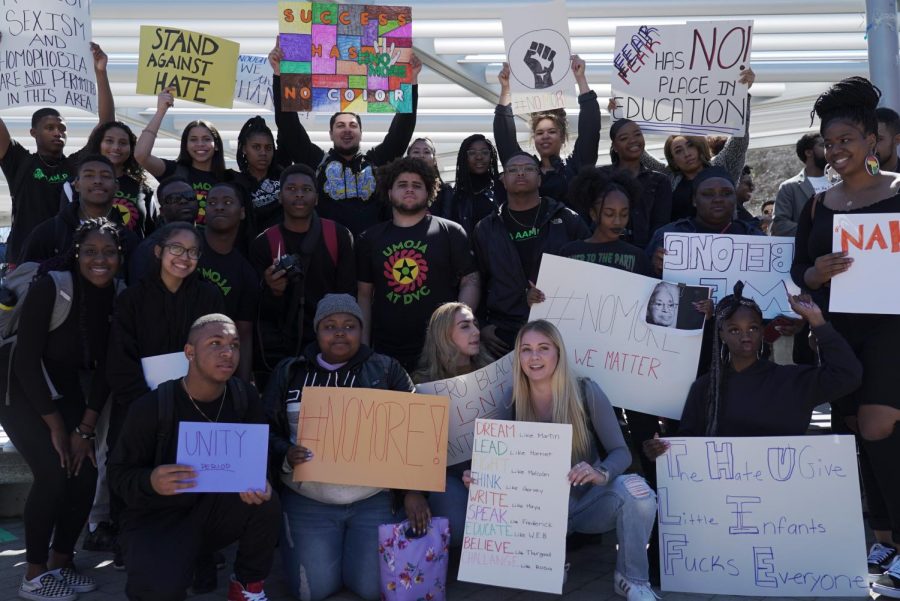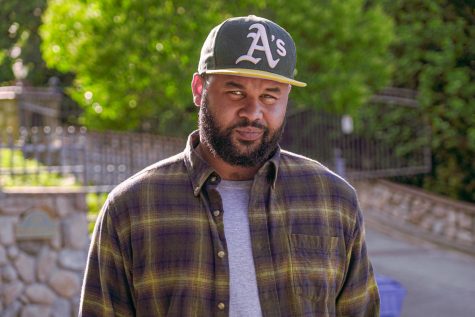DVC calls for phase one of student demands
On March 13, students of color and others gathered for a photo shoot after the walkout. (Ethan Anderson/The Inquirer)
April 9, 2019
Mobilized students placed their demands at the foot of Diablo Valley College administration during a rally that took place on March 13.
Students in the Umoja, Puente, and MESA programs have been the driving force in this campus wide movement. Their demands were met with agreement, imploring the mobilization leaders to suggest further action.
The first step in mandating any of the demands began with a meeting held during Umoja’s Cohort seven sociology class on Monday, March 25, where Lamb continued the “ongoing conversation,” and explained what can realistically be done.
“It was basically just an exchange of information,” said Umoja member and student leader Arieal Young.
Young has been at the forefront of the entire movement since its inception, alongside other student leaders including Vannessa Galang, Bishari Taylor, Dj Lockett, and many more. During the rally, Young and Galang spoke with Lamb face to face. Afterward, a meeting was scheduled for March 25.
After the first meeting with Lamb, Associated Students of DVC also held a discussion on March 26. Galang, Young, and Taylor attended, as two student officers opposed the idea of talking about racism further — for fear of inciting more incidents at DVC. In response, Galang pushed for faculty members to bring up these issues in class, especially since many students had not heard about the graffiti when it first occurred.
“Now, what should really happen is that it should be brought to more people’s attention,” said Galang.
Two demands were heavily emphasized by the student leaders. The first was a mandatory anti-racist training and second involved a robust Ethnic Studies Department.
The implementation of these demands involves multiple academic organizations cooperating through the process. Lamb does not have the authority to mandate, but the overall goal of creating better conditions for students of color extends across the administration.
“How do we best create an environment where the graffiti has minimal impact on our students while providing our students with the best skills to be resilient against hate?” said Lamb.
Lamb also explained the specifics of what will be done moving forward. To keep the process organized, Galang and Young have begun to form committees to overcome the multifaceted process for revitalizing DVC’s institutional infrastructure.
To create a contract outlining anti-racist or bias training in addition to a new Ethnic Studies Department, the procedures begin with the Academic Senate. The Senate is primarily run by the social science department. Lamb has agreed to work closely with both organizations, to ensure an agreement is met. According to an email sent faculty-wide by Beth McBrien, head of the Academic Senate, a discussion about the racist graffiti will be held on April 9 at 4:00 p.m. in the BFL Conference Room.
Lamb has explained on numerous occasions that these demands are not simple. They involve multiple levels within the district and some of the in-class decisions of what to place within a curriculum, are left up to the discretion of faculty. Having professors illuminate racial bias in their classroom becomes a discretionary problem if the demands are to be met.
Because professors at DVC are able to create their own curriculum, according to Lamb, the authority to choose whether or not to mention any racial incidents is within the right of that faculty member. They have the ultimate say in whether or not certain issues can be discussed. Despite that being the case, she claims that she will be working with professors on a way to add these topics into their curriculums.
Lamb is also currently in negotiations with the Local 1 and United Faculty organizations, who are the central force in procuring a contract — such as racial bias or the current sexual harassment prevention training already in place.
Without the training, students have expressed that it would open a pathway for further racism. The main goal is to educate individuals on the existence of racial bias, given that some overlook it.
“I’ve never experienced anything like this. Its just people, you just live,” said Lockett. “I’ve never seen outward hate like that.”
For the coming year, there will be an equity plan designed to shed light on this issue. It will involve the demands as well and a task force to create a channel for broad feedback.
Moving forward, the conversation continues.






































































